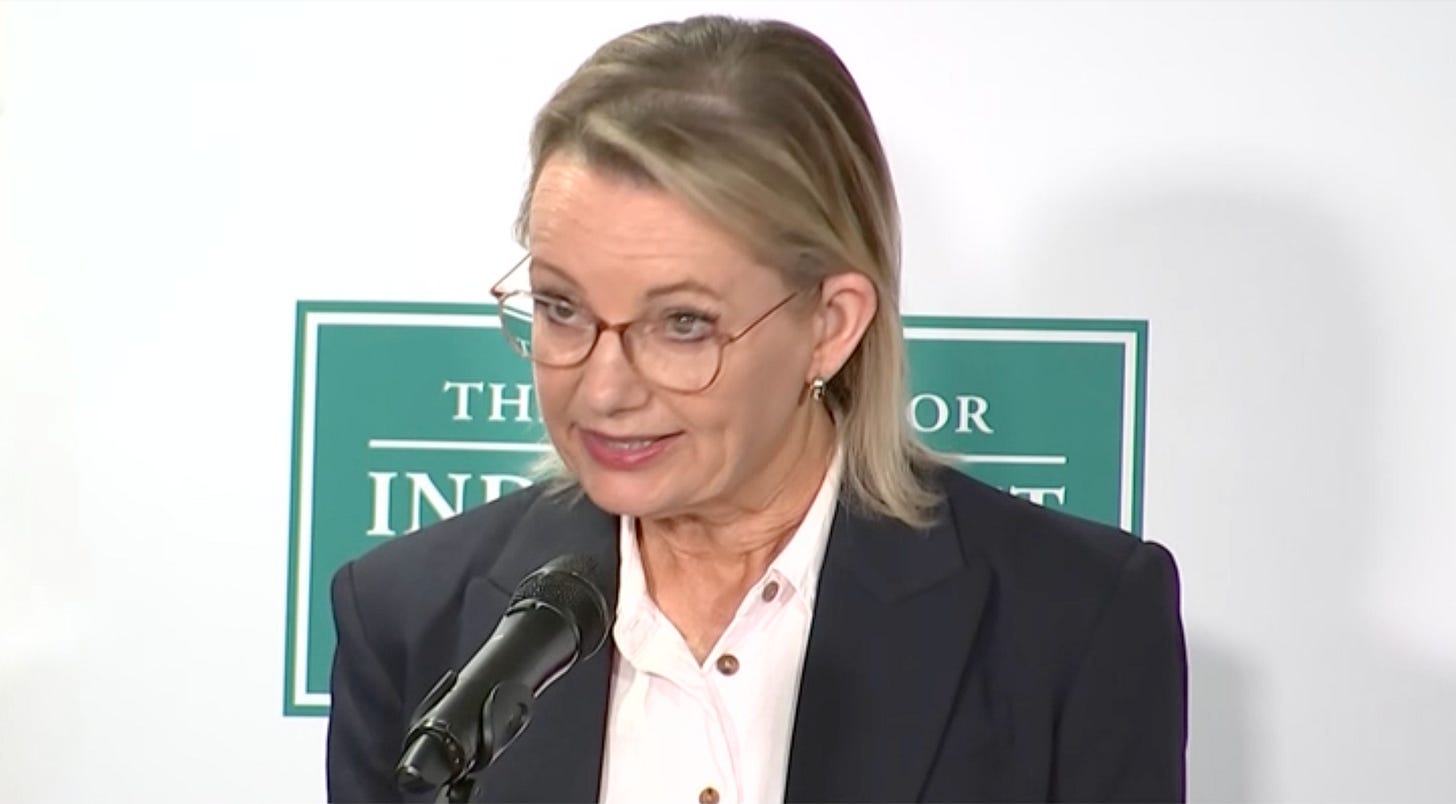Opposition Leader Ley Promises Income Tax Cuts, Warns of Productivity Crisis Under Labor
This piece is freely available to read. Become a paid subscriber today and help keep Mencari News financially afloat so that we can continue to pay our writers for their insight and expertise.
Today’s Article is brought to you by Empower your podcasting vision with a suite of creative solutions at your fingertips.
Opposition Leader Sussan Ley has committed the Coalition to delivering personal income tax cuts at the next federal election, positioning lower taxes and budget repair as dual pillars of an economic agenda she says will reverse Australia’s worst productivity decline in six decades.
Speaking to the Centre for Independent Studies on Monday, Ley outlined what she described as a comprehensive plan to address a productivity crisis that has left Australian living standards falling faster than any other developed nation. The announcement marks a significant policy departure for the Liberal-National Coalition following its historic electoral defeat in May 2025.
Truth matters. Quality journalism costs.
Your subscription to Mencari directly funds the investigative reporting our democracy needs. For less than a coffee per week, you enable our journalists to uncover stories that powerful interests would rather keep hidden. There is no corporate influence involved. No compromises. Just honest journalism when we need it most.
Not ready to be paid subscribe, but appreciate the newsletter ? Grab us a beer or snag the exclusive ad spot at the top of next week's newsletter.
Ley declared she had “never been more convinced, more determined and more passionate about anything” in public life than her commitment to ensuring Australians keep more of their earnings. The opposition leader framed the tax relief as both economic necessity and moral imperative, directly challenging the Albanese government’s fiscal management.
The Coalition will prioritize low and middle-income earners experiencing pressure from higher prices and rising living costs, though Ley stopped short of specifying the scale or scope of the proposed cuts. She indicated the final package would be determined as budget positions become clearer over the next two and a half years.
The announcement comes as Australia grapples with significant economic headwinds. Real household disposable income per capita has fallen six percent since Labor took office in 2022, with OECD data showing Australia experienced the largest decline in living standards among developed nations.
Productivity growth over the past decade has fallen to its weakest rate in 60 years, according to analysis Ley cited from the Productivity Commission and business groups. She warned that without urgent reform, future generations would inherit diminished economic opportunities and mounting debt burdens.
The opposition leader established two primary objectives for her shadow ministry: lower personal income taxes and budget repair. Every time the Coalition opposes Labor spending, those savings will be directed either toward returning money to taxpayers or strengthening national finances.
Ley’s economic critique centered on what she characterized as Labor’s failure to restrain pandemic-era spending levels. Under the Albanese government, eight out of every ten new jobs have been created by government rather than the private sector, she claimed, arguing this ratio demonstrates fundamental misunderstanding of economic growth drivers.
The opposition leader pointed to rising tax burdens as evidence of misplaced priorities. Last year, the Albanese government collected more than $650 billion in taxes—almost $2 billion every single day. She argued that instead of paying down debt, Labor continues to pile on additional taxes and spending.
Tax burden projections paint a concerning picture for workers, according to Ley’s analysis. When former Prime Minister John Howard left office, the average worker paid 22.3 percent of income in tax; today that figure stands at 24.3 percent, with Parliamentary Budget Office projections showing it will climb to 27.7 percent by 2035-36.
Beyond taxation, Ley outlined a comprehensive regulatory reform agenda targeting what she described as excessive red tape strangling business growth. Since Labor took office, more than 5,000 new regulations and 400 new laws have been introduced, adding at least $4.4 billion in extra compliance costs.
The opposition leader cited housing approvals as a particular concern. According to the Housing Industry Association, obtaining environmental approval for new housing projects can take four years. She argued that tens of thousands of businesses have collapsed since 2022, with small business owners facing up to 30 separate regulatory steps just to open a cafe.
On workplace relations, Ley signaled intention to reverse Labor’s industrial relations changes. She criticized multi-employer bargaining laws as threatening small businesses with conditions they cannot afford, and condemned industry-wide pay settings as winding the clock back to the 1970s.
The Coalition will support enterprise-level bargaining where businesses and staff can strike agreements rewarding higher performance, Ley said. In a notable policy shift, she explicitly endorsed work-from-home arrangements, acknowledging the Coalition “got that wrong” during the recent election campaign.
Ley’s productivity agenda includes accelerating project approvals, reforming tertiary education and training systems, and revitalizing competition policy. She called for a fresh examination of markets from energy to banking to transport, ensuring they remain truly competitive with consumer choice.
The opposition leader defended her decision to announce major policy directions more than two years before the next election. She acknowledged anticipating a “campaign of fear and cuts” from Labor but insisted on refusing to “lead a Liberal Party that rolls itself into a small ball because of a fear campaign”.
When pressed on how tax cuts would be funded alongside increased defense spending commitments, Ley pointed to three areas: addressing intergenerational unfairness, eliminating government waste and inefficiency, and controlling runaway spending in programs like the National Disability Insurance Scheme.
Ley confirmed the Coalition will outline a pathway to budget surplus at the next election, emphasizing the importance of giving Australians confidence that intergenerational unfairness and unrestrained government spending will be tackled.
The speech comes amid ongoing coalition instability, with former Nationals deputy leader Barnaby Joyce announcing his departure to One Nation. Ley declined to discuss internal coalition matters in detail, describing the situation as “regrettable” while expressing hope Joyce might reconsider.
On energy policy, the opposition leader defended the Coalition’s commitment to maintaining the 2050 net zero target while emphasizing it must not come “at any cost.” She outlined two fundamental principles: delivering stable, reliable grid power at affordable prices for households and businesses, while playing a responsible international role in reducing emissions.
The Centre for Independent Studies event provided Ley a platform to articulate what she framed as enduring liberal principles: freedom, choice, aspiration, enterprise, and reward for effort. She drew on personal experience as a migrant, pilot, farmer, and tax officer to illustrate her conviction that government must enable rather than obstruct Australian prosperity.
With productivity growth forecast by the Reserve Bank at just 0.7 percent—barely half of Treasury’s assumptions—Ley warned the nation faces a choice between continued decline under Labor or a reform agenda focused on rewarding effort and restraining government overreach.
The opposition leader’s speech marks the opening salvo in what promises to be a protracted debate over Australia’s economic direction heading into the next federal election, expected in 2027.
Sustaining Mencari Requires Your Support
Independent journalism costs money. Help us continue delivering in-depth investigations and unfiltered commentary on the world's real stories. Your financial contribution enables thorough investigative work and thoughtful analysis, all supported by a dedicated community committed to accuracy and transparency.
Subscribe today to unlock our full archive of investigative reporting and fearless analysis. Subscribing to independent media outlets represents more than just information consumption—it embodies a commitment to factual reporting.
As well as knowing you’re keeping Mencari (Australia) alive, you’ll also get:
Get breaking news AS IT HAPPENS - Gain instant access to our real-time coverage and analysis when major stories break, keeping you ahead of the curve
Unlock our COMPLETE content library - Enjoy unlimited access to every newsletter, podcast episode, and exclusive archive—all seamlessly available in your favorite podcast apps.
Join the conversation that matters - Be part of our vibrant community with full commenting privileges on all content, directly supporting The Evening Post (Australia)
Catch up on some of Mencari’s recent stories:
It only takes a minute to help us investigate fearlessly and expose lies and wrongdoing to hold power accountable. Thanks!








